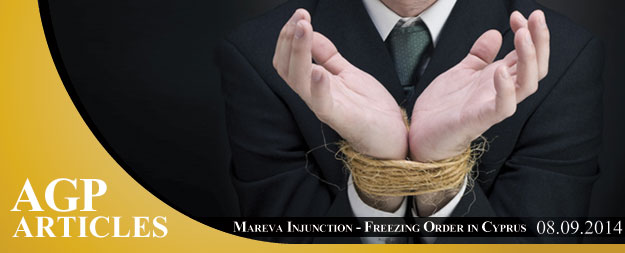
Recommended contact person
The Mareva Injunction is an injunction that freezes assets and restricts the owner of the assets from dealing with or removing the assets before a judgment against the owner has been made. The idea is to ensure that if the plaintiff is entitled to relief, justice will be served.
The Mareva principle stems from the decision made in the case of Mareva CompaniaNaviera S.A v International Bulkcarriers S.A (The Mareva) C.A June 23, 1975 where Lord Denning stated: “…the principle applies to a creditor who has a right to be aid the debit owing to him, even before he has established his right by getting judgment for it. If it appears that the debt is due and owing – and there is a danger that the debtor may dispose of his assets so as to defeat it before judgment. The Court has jurisdiction in a proper case to grant an interlocutory judgment so as to prevent him disposing of those assets”.
As Cyprus companies are frequently used as world wide holding structures and tax structures, there as been an increase in applications for asset protection to the Cyprus courts.
The Supreme Court of Cyprus has assessed, applied, and adapted the Mareva Injunction principle, and the doctrine of equity is applicable in Cyprus under Section 29 of the Courts of Justice law (Law 14/60).
Though the courts in Cyprus have power to grant such orders, such a decision for an injunction is not taken lightly. The Court assesses various criteria beforehand; it must be fully satisfied that the plaintiff will ‘probably’ be entitled to relied and that unless an injunction is put into place, justice may not be served now or at a later date; the plaintiff must prove that it is their strong belief that without the injunction, the risks of the assets being removed or dissipated before the judgment has been served is high; and the plaintiff must also give an undertaking as to damages.
So then the question arose:
Is the Mareva Injunction applicable outside the jurisdiction of the court?
Previous case law in England held that the Mareva Injunction should be limited to the assets of the defendant within the jurisdiction of the court as it would be too complicated, too difficult, and not very “desirable” to control such foreign proceedings (Ashtiani v Kashi 1987 Q.B. 888).
The Supreme Court in Cyprus looked carefully into this limitation of jurisdiction and analyzed it in the case of Seamark Consultancy Services Ltd v Joseph P. Lasala and Fred S. Zeidman, Co-Trustees of the Aremisoft Liquidating Trust C.A. No. 71/2006, 74/2006, 92/2006.
Here the court ruled that factors such as modern technological progress, enlargement, and the increased use of the Cyprus company…etc., has made it very simple for defendants to transfer their assets almost immediately, and at times, with just a click of a button, and as there have been a growing number of defendants hiding assets abroad beyond the reach of plaintiffs, a Mareva Injunction may be granted in respect of assets abroad in appropriate cases.
So, as long as the courts in Cyprus are satisfied that the plaintiff is entitled to relief and that there is a high risk of the assets being disposed of, it will issue the Mareva Injunction, now capable of crossing borders into other jurisdictions, in order to protect the plaintiff and ensure justice is served.














